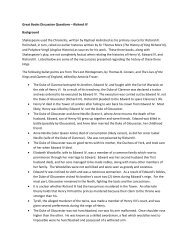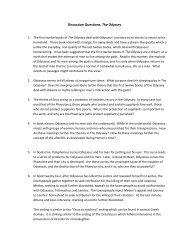1 Wordsworth's Literary Precedents: Derivation and ... - Peter Ponzio
1 Wordsworth's Literary Precedents: Derivation and ... - Peter Ponzio
1 Wordsworth's Literary Precedents: Derivation and ... - Peter Ponzio
You also want an ePaper? Increase the reach of your titles
YUMPU automatically turns print PDFs into web optimized ePapers that Google loves.
an ability to group objects together <strong>and</strong> to eliminate everything that is extraneous or<br />
superfluous, allowing him to display the “essence” of the object in his poems.<br />
Wordsworth does this by reflecting on the objects he wishes to write about in tranquility,<br />
<strong>and</strong> to refine the image he is thinking about until he is satisfied that he had captured its<br />
“essence.” Pottle notes that Wordsworth does not start with the general, to arrive at the<br />
particular, but “rather he starts with the particular, <strong>and</strong> ratifies it until he arrives at its<br />
meaning” (15- 16).<br />
This habit of reacting to sensation, <strong>and</strong> then refining the sensation in later,<br />
contemplative reflection, is one of the tenets of Wordsworth’s theory of poetry <strong>and</strong> is<br />
elaborated in the Preface to Third Edition of the Lyrical Ballads, as follows:<br />
Imagination, in the sense of the word as giving title to a class of the following<br />
Poems, has no reference to images that are merely a faithful copy, existing in the<br />
mind, of absent external objects; but is a word of higher import, denoting<br />
operations of the mind upon those objects, <strong>and</strong> processes of creation or of<br />
composition, governed by certain fixed laws. (803)<br />
James Heffernan, in his book <strong>Wordsworth's</strong> Theory of Poetry: The Transforming<br />
Imagination, maintains that imagination is the defining characteristic of Wordsworth’s<br />
poetry, <strong>and</strong> is his real contribution to poetic theory <strong>and</strong> the source of the enduring appeal<br />
of his work.<br />
Heffernan maintains that Wordsworth originally de-emphasized the creative or<br />
imaginative power of the author, <strong>and</strong> sought instead to capture an almost intuitive insight<br />
into feelings, as the following excerpt demonstrates.<br />
The poet, he insists, must not interfere with the gush of natural feeling, for a<br />
prudently selected subject will automatically generate passionate effusions of<br />
richly figurative language. …Depending only on the principle of selection, he will<br />
refrain from embellishing the speech of instinct <strong>and</strong> impulse, realizing as he does<br />
so that “no words, which his fancy or imagination can suggest, will be<br />
[comparable] with…the emanations of reality <strong>and</strong> truth.” (42-3)<br />
14




